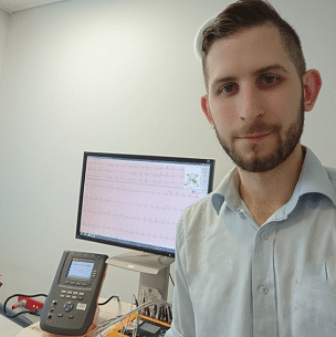Do you want to be at the forefront of improving and saving lives? Biomedical engineering lets you do just that. Read on to find out more about why you should pursue this exciting engineering discipline at the Engineering Institute of Technology (EIT).
Bridging the gap between engineering and medicine, biomedical engineering is a unique interdisciplinary field that covers a wide range of subjects from basic electrical engineering to biomechanics and assistive technology.
Biomedical Engineering is currently the fastest-growing fields of engineering, projected to have a very strong jobs growth over the next 5 years. Engineers within the field work to develop innovative materials, processes, implants, devices and approaches for the prevention, diagnosis, and treatment of disease, for patient rehabilitation and health improvement.
The increasing demand for biomedical engineers can be linked to society’s general shift towards everyday utilization of technology in all aspects of our lives. Notably, biomedical engineers can work in hospitals, clinics, laboratories, manufacturing companies, technology companies, pharmaceutical companies, research and development, or service and maintenance.
Biomedical engineering at the Engineering Institute of Technology (EIT)
We recently held an information webinar about our 52705WA – Advanced Diploma of Biomedical Engineering where attendees could hear more about the exciting field from EIT instructors, Dr. Kerry Newlin and Bruce Morrison.
“Simply put, we’re engineers that work in other people’s spaces,” explained Mr. Morrison.
The dynamic nature of the field allows for a variety of opportunities because it merges the principles of physical science with life science. Some biomedical engineers can find themselves working on bionic limbs while others are developing AI principles to advance health monitoring tools.
Whatever you do, you’ll make a powerful impact on patients’ treatment, recovery and quality-of-life as a biomedical engineer.
“What sets it apart is that you learn anatomy. You have to learn about equipment to assist diagnosis and monitor and treat bodily symptoms,” explains Dr. Newton.

Our 52705WA – Advanced Diploma of Biomedical Engineering ensures students learn the structure and function of the human body, allowing them to apply their engineering skills to medicine and human biology. Students are able to advance their knowledge, no matter what discipline they come from.
EIT graduate, Ryan Smith, started his career within the audio engineering industry and it was his curiosity for technology and problem solving that drew him to biomedical engineering.
“I chose biomedical engineering to compliment my background in electronics and further understand how technology interplays with anatomy and physiology,” explained Ryan.
Through studying with EIT, Ryan was able to increase his visibility in the biomedical field and continue his work into utilizing technology to make people’s lives better.
“I have an elevated level of confidence in my day-to-day work life, thanks to my qualification. It’s opened up various avenues for my career and inspired me to continue studying in the biomedical sciences field.”
What to expect when studying with EIT
EIT’s 18 month 52705WA – Advanced Diploma in Biomedical Engineering is delivered with a strong practical focus. It covers a variety of skills required to service and maintain healthcare equipment.
Upon completion of the program, students will have gained skills and knowledge in the latest and development technologies within the field of biomedical engineering.
The program is composed on 18 modules that cover a range of aspects to provide you with maximum practical coverage in the field. With modules from technical and specification writing to biomedical image processing, the program ensures you graduate with cutting-edge skills that are valued by employers around the world.
Potential job outcomes from this program can include:
- Field Service Technician
- Medical Equipment Service Technician
- Engineering Technician
- Instrumentation Technician
- Medical Sales Technician
- Engineering Associate
- Maintenance Technician
Students will have the opportunity to interact with a variety of virtual and remote labs while learning from highly experienced engineers and biomedical engineering professionals.
Most importantly, EIT understands that students studying online will have work commitments and personal circumstances to balance their studies with. This program is designed to fit around full-time work and is studied on an intensive part-time basis.
Students are expected to spend approximately 10-15 hours per week learning the program material and completing assessments. This includes attending weekly webinars that run for about 90 minutes to facilitate class discussion and allow you to ask questions.
If you are ready to make your mark in this life-changing field, you can find out more information on the course page or talk to a Course Advisor today.
References


